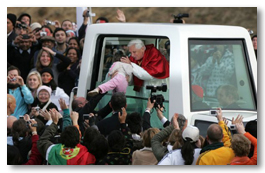A Better Way to Ask the Big Questions
- FATHER RAYMOND J. DE SOUZA
In turns out that Sydney may play a decisive role in how those Anglican disputes are worked out.
 |
Pope Benedict XVI arrived here on Sunday for the World Youth Day (WYD), which runs through this weekend. The WYD, as Torontonians would remember from our hosting it in 2002, is by far the largest gathering of young adults in the world. When they held it in Manila in 1995, the final papal Mass drew upwards of four million people -- perhaps the largest assembly in human history.
On the long flight to Sydney, Benedict took questions from journalists, one of which asked about the recent general synod of the Church of England and the upcoming Lambeth Conference of the global Anglican Communion. As expected, the pope did not enter into recent Anglican disputes, but simply wished the gift of unity for them.
In turns out that Sydney may play a decisive role in how those Anglican disputes are worked out. The Anglican Archbishop of Sydney, Peter Jensen, has emerged as a champion of traditional Christian orthodoxy, at least on moral questions, and is boycotting the Lambeth Conference to protest the lack of doctrinal clarity and discipline from the Archbishop of Canterbury, Dr. Rowan Williams. Indeed, about a quarter of the world's Anglican bishops, representing over half of the global Anglican Communion have decided to boycott.
Archbishop Jensen will not be in Sydney to meet Benedict, even though he is sympathetic to the youthful profession of Christian orthodoxy that WYD brings to town. But this delicate time is not propitious for a leading Anglican archbishop to be seen revelling at a papal festival.
Leaving aside the substantive issues involved, the confluence of WYD with Lambeth 2008 provides a glimpse into the options available to global Christianity in the 21st century, whether the particular configurations be Catholic, Anglican or otherwise.
"In the middle of all our discussions at synod, where would Jesus be?" asked Canterbury in his sermon last week at York Minster. "He will be all over the place … Where will Jesus be? In whose company? The company of those who feel lost; have lost; and who are just beginning to see that lostness is the beginning of wisdom."
There is something to that, of course, as it is not for us to know the inscrutable designs of Providence. Yet there is also in Canterbury's approach something unsettling, if indeed unsettled-ness is the route to discerning the Lord's will for us. Those with a more exacting approach to the scriptures -- Archbishop Jensen among them -- would note that the beginning of wisdom is the fear of the Lord, not lostness.
In advance of his arrival in Australia, Benedict released a message to Australians, offering a rather different approach to those young people who are asking themselves the deeper questions of life.
"Where can we look for answers?" Benedict asks. "The Spirit points us towards the way that leads to life, to love and to truth. The Spirit points us towards Jesus Christ. In him we find the answers that we are seeking, we find the goals that are truly worth living for, we find the strength to pursue the path that will bring about a better world."
Of course, Canterbury would agree that in Jesus Christ we find the answer to every question -- as would anyone who believes that Jesus Christ is Lord. Yet the two approaches remain different.
Does the spiritual life pose questions that have no definitive answers, in which we experience the limits of our knowledge as a threshold across which lies the unfathomable mystery of God? Or does the life of faith reveal to us truths that, while always beyond our capacity to comprehend, grant us certain knowledge of things that we can know to be true -- things about ourselves, about the world we live in and about God?
You will find Catholics and Anglicans with both approaches, but it is fair to say that the latter approach characterizes the Catholic disposition at the beginning of the 21st century, while the former is more Anglican.
I like to tell my own students back home that while many good questions are difficult to answer, the mark of a good question is that it leads to an important answer. Questions which don't lead to answers at all may be intellectually intriguing, but provide no foundation upon which to anchor a truth, build a philosophy or establish a mission in life.
In Sydney, whether it be the Anglican archbishop or the Catholic pope and his young pilgrims, it is answers that are being sought, with confidence that answers are to be found.
 This is Meaghen Gonzalez, Editor of CERC. I hope you appreciated this piece. We curate these articles especially for believers like you.
This is Meaghen Gonzalez, Editor of CERC. I hope you appreciated this piece. We curate these articles especially for believers like you.
Please show your appreciation by making a $3 donation. CERC is entirely reader supported.

Acknowledgement
Father Raymond J. de Souza, "A better way to ask the big questions." National Post, (Canada) July 17, 2008.
Reprinted with permission of the National Post and Fr. de Souza.
Image courtesy of WYD 2008 ACN 118 060 987 as Trustee for the World Youth Day 2008 Trust ABN 73 422 698 032
The Author
Father Raymond J. de Souza is the founding editor of Convivium magazine.
Copyright © 2008 National Post



